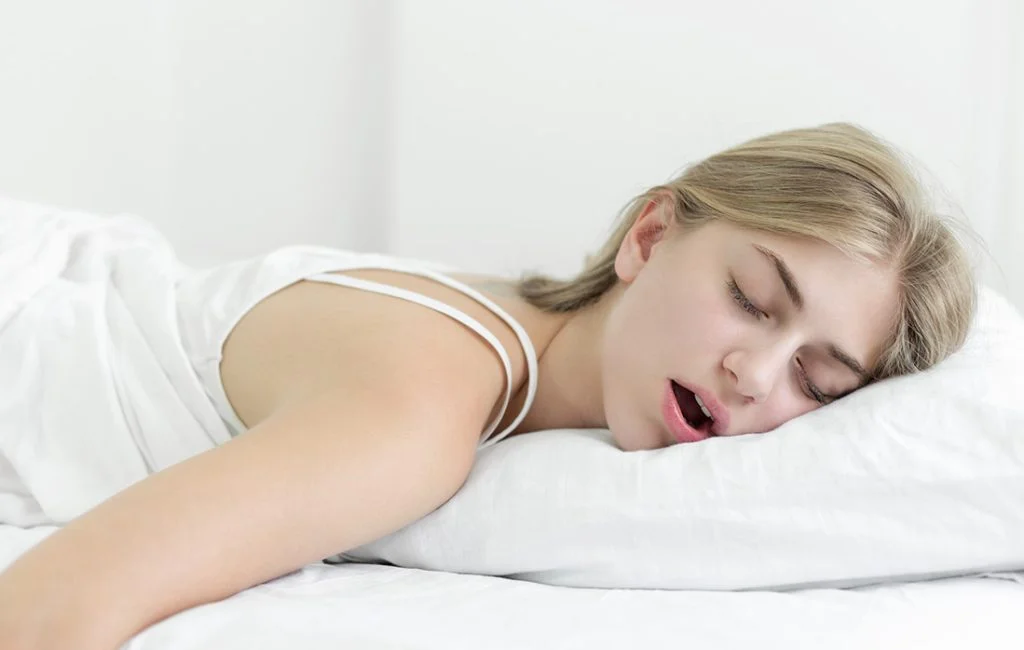
We know about blue light and bedtime, cozy sheets and cool temps for optimal sleep. But, scientists are rapidly discovering just how interwoven our sleep is into all of our body systems, including our teeth. And, the opposite is true — teeth health sometimes means sleep health as well. How does this happen?
A 2024 systematic review of research and meta-analysis found that periodontitis rates were high in those who didn’t get enough sleep. (1) Periodontitis is a fancy word for gum disease, in which gum infection damages that soft tissue around the teeth, and can destroy the bone that supports teeth, leading to tooth loss, Mayo Clinic reports. In the study, those who slept less than five hours per night had a higher prevalence for the condition, supporting older findings in a 2021 study amongst middle-aged Japanese workers as well.
Researchers dug through many studies, landing on 11 that they’d include in analyzing the connection between gum disease and sleep. In addition, people who slept in the daytime were shown to have an increased risk as well.
One potential theory the researchers explained is that Obstructive Sleep Apnea (OSA) has been associated with periodontitis, and those with OSA sometimes have trouble with sleep duration. So, the conditions might be linked to those oral health care conclusions. In a cyclical way, people with short sleep duration are also more likely to overeat, and obesity is a risk factor for OSA as well. In addition, those who aren’t sleeping well are more likely to have mental health concerns, which can impact immune response and therefore cause a further increased risk for periodontitis.
This new review joins other research in linking sleep issues with gum disease. A 2020 study amongst 10,291 individuals found that those who slept less than seven hours had a 36 percent higher probability of developing periodontitis compared to those who got more than seven hours of sleep. (2) Additional studies, including a 2021 study of shift workers, found that overall sleep patterns (such as those of shift workers), led to a higher probability of developing periodontitis. (3)
Most importantly in the new review is the fact that getting fewer than five hours of sleep puts you at a much higher risk of gum disease. So, it’s not just losing a few hours compared to recommended sleep times, it’s significant sleep loss that is associated with the largest associations between the conditions.
Even if you don’t develop periodontitis, sleep and gum inflammation are also linked, potentially due to increases in inflammatory responses when you aren’t getting enough high-quality rest. Other potential links exist between sleep and bruxism, jaw pain, and cavities.
Unfortunately, the best advice for keeping your pearly whites until a ripe old age is the same advice you’ve heard since childhood: brush your teeth, observe sleep hygiene rituals and practices, and go the heck to bed.
Sources
1. Qun Zhou, Fangfei Ye, Siying Zhang; “Sleep Duration and Risk of Periodontitis—A Systematic Review and Meta-Analysis,” International Dental Journal, 2024, ISSN 0020-6539, https://doi.org/10.1016/j.identj.2024.02.016. March 30, 2024.
2. Alhassani, Ahmed A.; Al-Zahrani, Mohammad S. “Is inadequate sleep a potential risk factor for periodontitis?” PLOS One Journal; https://journals.plos.org/plosone/article?id=10.1371/journal.pone.0234487#sec007; June 16, 2020.
3. Park, Jung Soo; Jeong, Yujin; Jung, Junho; Ryu, Jae-Jun; Lim, Ho-Kyung; Jung, Seok-Ki; Song, In-Seok. “Shift work sleep disorder is closely associated with an increased risk for periodontal disease,” Journal of Clinical Periodontology; https://onlinelibrary.wiley.com/doi/abs/10.1111/jcpe.13508; June 7, 2021.

























